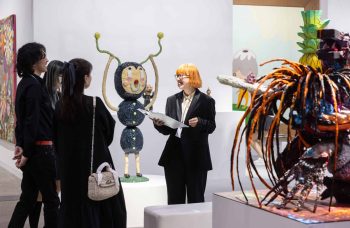The Iliad and the Odyssey are all that remain of a vast epic body of work which is now lost. These verses, sung in Greek and accompanied by a lyre, recount Achilles’ exploits and Ulysses’ travels. They have been able to survive because they were recorded in writing in the 6th century before the current era. Since then, the two poems have continuously been recopied, attributed to the Greek poet Homer who would have lived at the end of the 8th century before the current era. Now, the Louvre-Lens Museum has dedicated an exhibition to this mythic figure.
The exhibition attempts to consider such issues as: did Homer actually exist? Was he the sole author of this celebrated literary masterpiece? Where and when did he live? It also recognizes the importance of Homer in antiquity by presenting objects (craters, vases, sculptures, etc.) on which scenes from these two poems are depicted. Scenes of men, mostly, and intense passions: Ulysses and his companions brandishing their swords to blind the cyclops; Achilles, crazy with pain and rage following the death of his dear friend Patroclus, dragging the body of Hector, the defeated prince behind his chariot, in defiance of all laws of respect and honour. Homer certainly is not the poet of half-hearted measures…

But the inherent interest of the exhibition lies mainly in the influence that Homer exerted on artists, from the Renaissance to the present day: Rubens, Watteau, Gustave Moreau, Chagall, Cy Twombly and others. Sometimes, this influence is nothing more than a pretext, like when Primaticcio recalls an episode featuring Ulysses and his bow (a bow that only he can bend) to justify the grouping of silhouettes executed with virtuosity. But, Homer’s words resonate more profoundly: the Age of Enlightenment has thus fed his taste for excavating the ruins of rich reserves of poems to bring to life a landscape “of antiquity”, Hubert Robert imagines Alexander visiting Achilles’ tomb.
The greatest theme in the Odyssey is probably that of nostalgia. As philosopher Barbara Cassin wrote, “love and competition between lovers, the relationship between the new and the old, the way in which the new becomes old and impulse becomes habit, in short, time as a line and as a cycle, is one of the keys to nostalgia”. The nymph Calypso, daughter of Poseidon, kept Ulysses for seven years on her island. At night, he shared his bed, but during the day he would weep before the ocean. He had nostalgia for his homeland, for his home and for his wife Penelope. It was nostalgia that made going home preferable, even if it was simply to note the time that had passed and to find his wife aging and facing death. Ulysses preferred that which was finite and his own home to the supreme beauty of Calypso and to eternity, “Goddess mistress, pardon me, any wisdom she may possess, I know that compared to you, Penelope is without greatness or beauty. Because she is mortal; you, you will never know death, nor old age. But what I want, what I desire every day, is to return home and to see the return of the day”. Maybe it is this fundamental simplicity, this call to common passions that goes beyond the prestige of heroes, which has made the Homeric essays so successful. Everyone, at some point in their lives, may recognize in themselves the aspirations that set this great poetic figure on his quest: desire curiosity, glory and the love of one’s homeland…

Homer – from March 27 to July 22 – Louvre-Lens
Title image: Portrait of Homer, IIe s from a Greek original, Paris, Louvre – © Louvre Museum, dist. RMN-GP / Thierry Ollivier.






